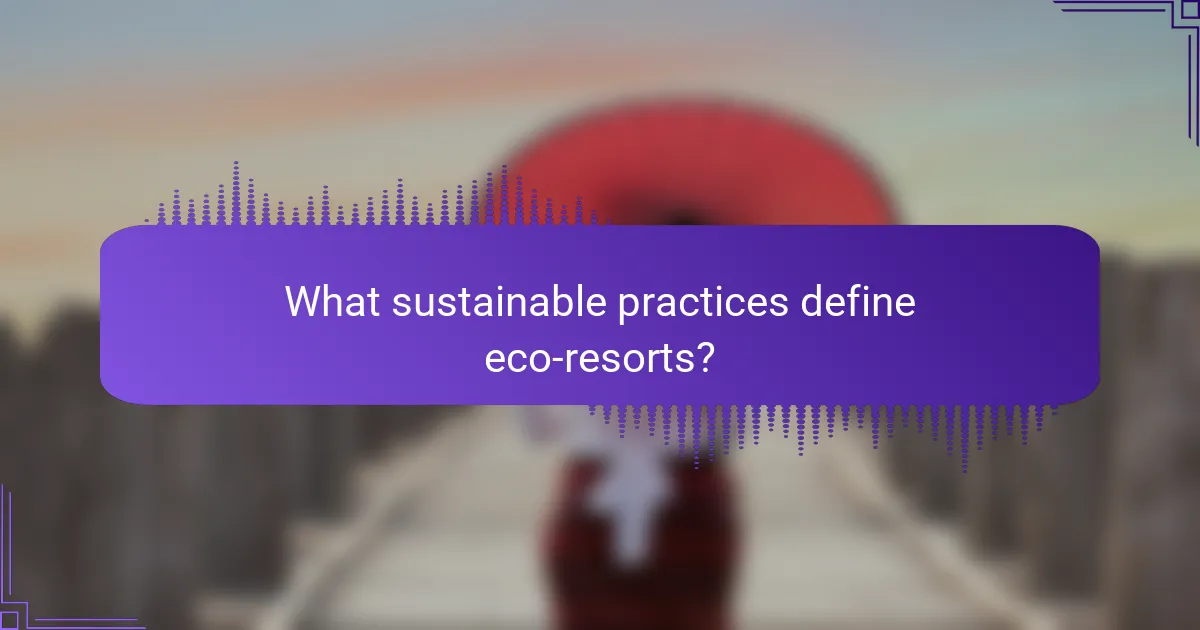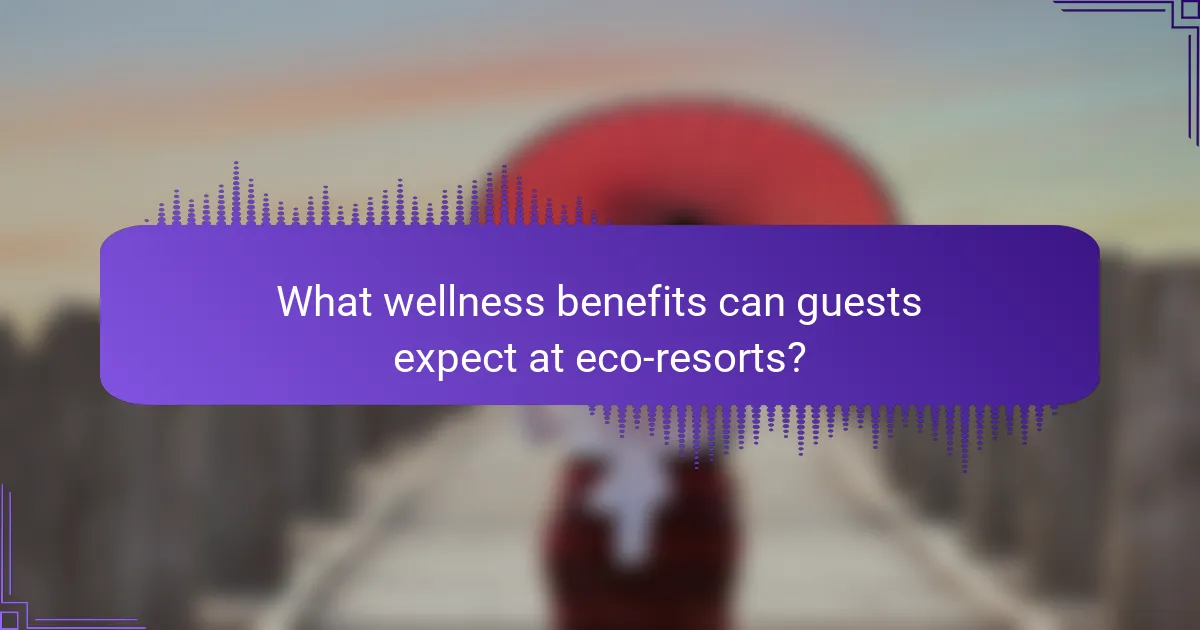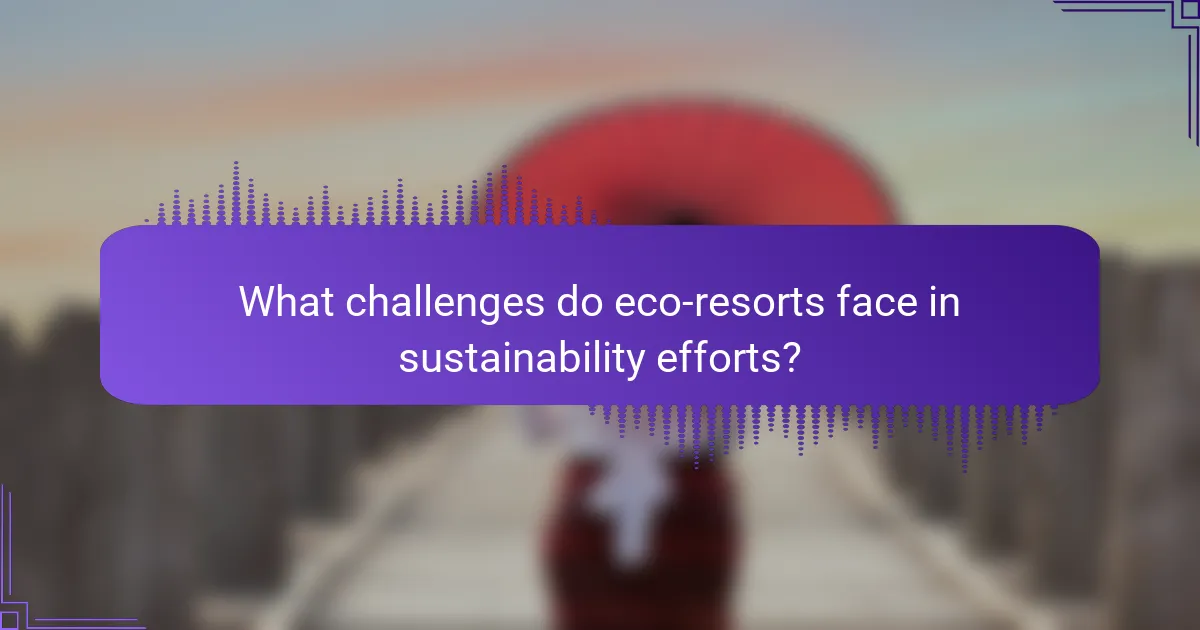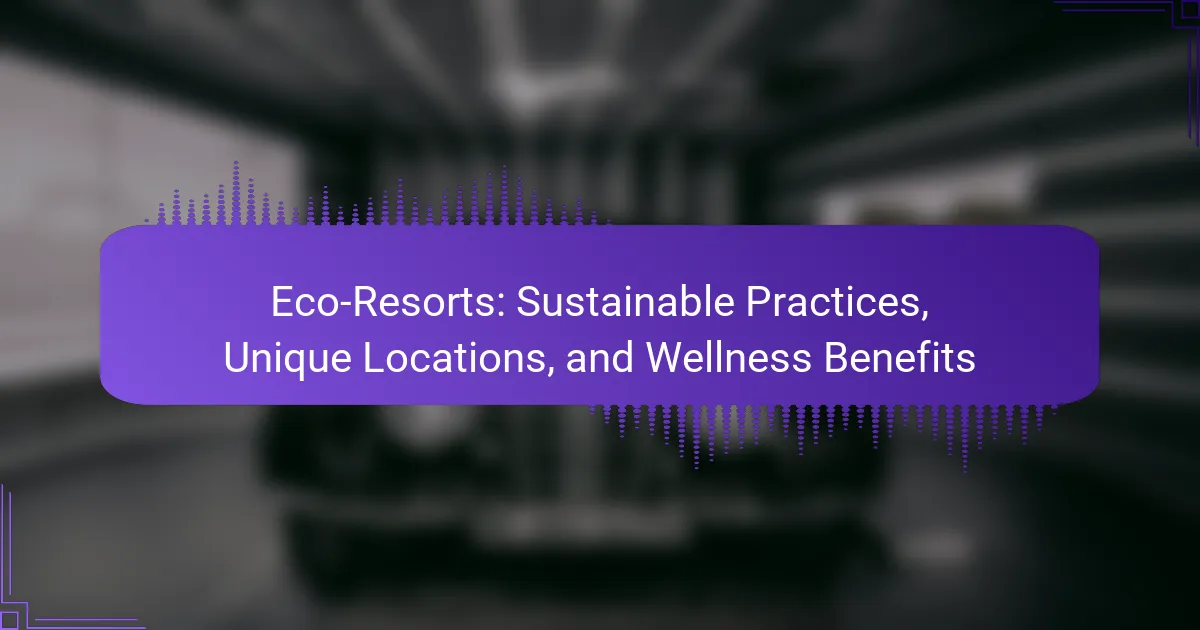Eco-resorts offer a unique blend of sustainable practices, stunning locations, and wellness benefits. They utilise renewable energy, engage with local communities, and prioritise organic food sourcing. These resorts provide opportunities for relaxation and mental clarity in natural settings. With a focus on environmental conservation and holistic health, eco-resorts are becoming increasingly popular among eco-conscious travellers.

What sustainable practices define eco-resorts?
Eco-resorts are defined by sustainable practices such as renewable energy use, waste reduction, and local community engagement. These practices minimise environmental impact while promoting conservation. Eco-resorts often implement water-saving technologies and prioritise organic food sourcing. Unique locations enhance the experience, often integrating natural surroundings into their design. Wellness benefits include improved mental health and relaxation, stemming from the natural environments these resorts inhabit.
How do eco-resorts minimise their environmental impact?
Eco-resorts minimise their environmental impact through sustainable practices and eco-friendly designs. They utilise renewable energy sources, such as solar and wind power, to reduce reliance on fossil fuels. Water conservation measures, including rainwater harvesting and efficient irrigation systems, further lower their ecological footprint.
Additionally, eco-resorts often implement waste management strategies, such as composting and recycling, to minimise landfill contributions. They promote local biodiversity by preserving natural habitats and using native plant species in landscaping.
By sourcing food locally, eco-resorts support sustainable agriculture and reduce transportation emissions. These combined efforts establish a holistic approach to sustainability, enhancing the overall wellness benefits for guests while protecting the environment.
Which energy sources are commonly used in eco-resorts?
Eco-resorts commonly utilise renewable energy sources such as solar, wind, and hydroelectric power. These sustainable practices minimise environmental impact while providing energy for accommodations and amenities. Solar panels often serve as the primary energy source, harnessing sunlight for electricity and heating. Wind turbines may supplement energy needs in suitable locations. Additionally, some eco-resorts implement geothermal energy systems for heating and cooling. These energy sources align with the eco-resort ethos of sustainability and conservation.
What waste management strategies do eco-resorts implement?
Eco-resorts implement various waste management strategies to minimise environmental impact. These include composting organic waste, recycling materials, and utilising waste-to-energy systems. Many eco-resorts also educate guests on sustainable practices, encouraging responsible waste disposal. By integrating these strategies, eco-resorts promote a circular economy and reduce landfill contributions.
How do eco-resorts promote biodiversity and conservation?
Eco-resorts promote biodiversity and conservation by implementing sustainable practices that protect ecosystems. They often use eco-friendly building materials and renewable energy sources, minimising environmental impact. Additionally, eco-resorts engage in habitat restoration and support local wildlife conservation efforts. By educating guests about local flora and fauna, they foster a greater appreciation for nature. This holistic approach not only preserves biodiversity but also enhances the overall guest experience, aligning wellness benefits with environmental stewardship.

What unique locations are known for eco-resorts?
Unique eco-resorts are found in diverse locations worldwide, emphasising sustainability and natural beauty. Notable examples include:
1. Costa Rica – Renowned for its biodiversity and commitment to eco-friendly practices.
2. Maldives – Offers overwater bungalows with a focus on marine conservation.
3. Bali, Indonesia – Combines luxury with traditional Balinese architecture and organic farming.
4. Patagonia, Chile – Features stunning landscapes and initiatives for wildlife preservation.
5. British Columbia, Canada – Known for its forest retreats and focus on renewable energy.
6. Kerala, India – Emphasises wellness through Ayurvedic practices in tranquil settings.
How do coastal eco-resorts differ from mountain eco-resorts?
Coastal eco-resorts typically emphasise beach activities and marine conservation, while mountain eco-resorts focus on hiking, wildlife, and forest preservation. Coastal locations often provide water-based wellness benefits like surfing and swimming, whereas mountain resorts offer activities such as skiing and trekking. Both promote sustainability but differ in their unique environmental contexts and experiences. Coastal resorts may feature ocean-view accommodations, while mountain resorts highlight scenic mountain vistas. Each type caters to distinct preferences, making them unique in the eco-tourism landscape.
Which eco-resorts are located in rainforests and their significance?
Several eco-resorts located in rainforests focus on sustainability and wellness. These resorts play a crucial role in preserving biodiversity and promoting eco-friendly tourism.
Rainforest eco-resorts often utilise renewable energy sources, such as solar power, and implement waste reduction practices. They provide unique accommodations that blend with nature, offering guests immersive experiences.
The significance of these eco-resorts extends beyond tourism; they contribute to local conservation efforts and support indigenous communities. By prioritising environmental education, they foster a deeper understanding of rainforest ecosystems.
Examples include Inkaterra Machu Picchu Pueblo Hotel in Peru, which emphasises sustainable practices and cultural heritage, and Lapa Rios Lodge in Costa Rica, known for its biodiversity conservation initiatives.
What cultural experiences do eco-resorts in indigenous territories offer?
Eco-resorts in indigenous territories offer immersive cultural experiences that connect visitors with local traditions and practices. These resorts often feature guided tours led by indigenous community members, showcasing traditional crafts, storytelling, and culinary experiences. Visitors can participate in rituals and ceremonies, gaining insights into the spiritual and cultural significance of the land. Additionally, eco-resorts promote sustainable practices that honour the environment and indigenous ways of life, fostering a deeper appreciation for biodiversity and conservation efforts. Engaging with local communities enhances the overall wellness benefits of the stay, creating a holistic travel experience.

What wellness benefits can guests expect at eco-resorts?
Guests at eco-resorts can expect wellness benefits such as stress reduction, improved mental clarity, and enhanced physical health. These resorts promote holistic practices, including yoga, meditation, and organic meals sourced from local farms.
Unique locations in nature foster a sense of tranquility, encouraging relaxation and mindfulness. Many eco-resorts offer spa treatments that utilise natural ingredients, enhancing the overall wellness experience.
Sustainable practices contribute to a healthier environment, which positively impacts guest well-being. Eco-resorts often provide opportunities for outdoor activities like hiking and swimming, further promoting physical fitness and mental rejuvenation.
How do eco-resorts incorporate wellness into their offerings?
Eco-resorts integrate wellness by offering holistic experiences that promote physical and mental health. They often feature spa services, yoga sessions, and nutritious dining options sourced from local, organic farms.
These resorts prioritise natural surroundings, providing guests with opportunities for outdoor activities like hiking and meditation in serene environments. Unique attributes include eco-friendly architecture and sustainable practices that enhance relaxation and mindfulness.
As a result, eco-resorts create a harmonious balance between nature and wellness, allowing guests to rejuvenate while supporting environmental sustainability.
Which wellness activities are popular at eco-resorts?
Popular wellness activities at eco-resorts include yoga, meditation, hiking, and spa treatments. These activities promote relaxation and connection with nature. Many eco-resorts offer unique experiences like forest bathing and organic cooking classes. Such practices enhance well-being while supporting sustainable tourism.
What are the mental health benefits of staying at an eco-resort?
Staying at an eco-resort provides significant mental health benefits, including reduced stress and enhanced well-being. The natural surroundings promote relaxation and mindfulness, contributing to improved mood and cognitive function. Eco-resorts often incorporate wellness programs, such as yoga and meditation, which further support mental clarity and emotional balance. Engaging with nature also fosters a sense of connection and purpose, essential for mental health.

How do eco-resorts engage with local communities?
Eco-resorts actively engage with local communities by fostering sustainable development and cultural exchange. They often collaborate with local artisans, promoting traditional crafts and providing economic opportunities. These resorts may also implement environmental conservation programs that involve community participation, enhancing local awareness and stewardship. Additionally, eco-resorts frequently support local agriculture by sourcing food from nearby farms, which strengthens community ties and promotes healthy eating.
What economic benefits do eco-resorts bring to local areas?
Eco-resorts provide significant economic benefits to local areas by boosting tourism and creating jobs. They attract visitors seeking sustainable travel experiences, which stimulates local businesses. This influx of tourists often leads to increased revenue for restaurants, shops, and service providers. Additionally, eco-resorts typically employ local staff, enhancing job opportunities and contributing to community development. As a result, the economic impact extends beyond the resort itself, fostering overall regional growth and sustainability.
How do eco-resorts foster cultural exchange with visitors?
Eco-resorts foster cultural exchange by integrating local traditions into visitor experiences. They offer authentic interactions, such as workshops led by local artisans, which promote understanding of indigenous cultures. Many eco-resorts prioritise community involvement, ensuring that a portion of profits supports local initiatives. This mutual benefit enhances cultural appreciation and encourages sustainable tourism practices. Visitors often share stories and perspectives, enriching the cultural tapestry of both the travellers and the host community.

What challenges do eco-resorts face in sustainability efforts?
Eco-resorts face significant challenges in sustainability efforts, including resource management, community engagement, and environmental impact. Resource management involves balancing energy and water use with conservation practices. Community engagement is crucial for local support but can be difficult to achieve. Environmental impact concerns arise from construction and operation, often conflicting with eco-friendly goals. Additionally, financial constraints can limit the adoption of sustainable technologies and practices.
How do eco-resorts balance luxury and sustainability?
Eco-resorts balance luxury and sustainability by integrating high-end amenities with eco-friendly practices. They often utilise renewable energy sources, locally sourced materials, and sustainable waste management systems. This approach enhances guest experience while minimising environmental impact. Unique locations in pristine natural settings further attract eco-conscious travellers. Wellness benefits include access to nature, organic cuisine, and holistic wellness programs, promoting physical and mental well-being. Such resorts exemplify the harmony between indulgence and environmental responsibility, appealing to a growing demographic seeking sustainable luxury.
What regulatory hurdles do eco-resorts encounter?
Eco-resorts face several regulatory hurdles, including zoning laws, environmental permits, and health and safety regulations. These challenges can delay project timelines and increase costs. Compliance with local, state, and federal environmental standards is crucial for sustainable practices. Additionally, securing funding often depends on navigating these regulations effectively.

Which certifications are important for eco-resorts?
Certifications important for eco-resorts include Green Key, EarthCheck, and LEED. These certifications ensure sustainable practices, environmental responsibility, and energy efficiency.
Green Key focuses on eco-friendly management, while EarthCheck assesses environmental performance and sustainability. LEED emphasises energy-efficient building design. These certifications enhance credibility and attract eco-conscious travellers.
How does certification impact guest trust and choice?
Certification significantly enhances guest trust and influences their choice of eco-resorts. Verified eco-friendly practices assure guests of a commitment to sustainability. This assurance leads to higher booking rates, as travellers increasingly prioritise environmental responsibility. Unique certifications, such as LEED or Green Key, stand out and attract eco-conscious consumers. Additionally, positive reviews and recommendations often follow certified resorts, further solidifying trust and preference among potential guests.
What are the most recognized eco-certifications in the industry?
The most recognized eco-certifications in the industry include Green Key, EarthCheck, LEED, and Rainforest Alliance. These certifications indicate commitment to sustainable practices and environmental responsibility.
Green Key focuses on reducing environmental impact through energy and water conservation. EarthCheck emphasises sustainable tourism practices and community engagement. LEED certifies buildings based on their energy efficiency and sustainability. Rainforest Alliance promotes biodiversity and sustainable agriculture, benefiting local ecosystems.

What future trends are emerging in eco-resort development?
Emerging trends in eco-resort development focus on innovative sustainability, unique locations, and wellness integration. Eco-resorts increasingly adopt renewable energy sources, such as solar and wind, to minimise their carbon footprint. These resorts often feature locally sourced materials, enhancing their connection to the environment.
Unique locations, such as remote islands and forested areas, are becoming popular, attracting travellers seeking immersive nature experiences. Additionally, wellness benefits are prioritised, with many resorts offering holistic health programs, including yoga and organic cuisine.
As a result, eco-resorts are evolving into destinations that promote environmental stewardship while providing enriching guest experiences.
How is technology shaping the future of eco-resorts?
Technology is significantly shaping the future of eco-resorts by enhancing sustainability and guest experiences. Innovations like energy-efficient systems and smart waste management reduce environmental impact. Advanced booking platforms promote unique eco-locations, attracting eco-conscious travellers. Virtual reality tools help visualise resort offerings, enhancing marketing strategies. Additionally, technology-driven wellness programs, such as personalised health tracking, cater to guests seeking holistic experiences. These advancements align with the core values of eco-resorts, focusing on sustainability, unique locations, and wellness benefits.
Which innovative practices are being adopted by eco-resorts?
Eco-resorts are adopting innovative practices such as regenerative agriculture, renewable energy sources, and eco-friendly construction materials. These practices enhance sustainability while providing unique guest experiences. For example, some resorts implement water conservation systems and local sourcing of food to minimise their ecological footprint. Additionally, wellness programs often incorporate nature-based therapies and mindfulness activities, promoting holistic health benefits.
What role do eco-resorts play in promoting sustainable tourism?
Eco-resorts significantly promote sustainable tourism by prioritising environmental conservation and local community engagement. They implement eco-friendly practices like renewable energy use, waste reduction, and sustainable sourcing. Unique locations often enhance biodiversity preservation, attracting eco-conscious travellers. Wellness benefits include improved mental health through nature immersion and holistic experiences. These factors collectively foster a responsible tourism model that supports both ecological balance and local economies.
What are best practices for choosing an eco-resort?
To choose an eco-resort effectively, prioritise sustainability, unique location, and wellness offerings. Look for resorts that utilise renewable energy, support local communities, and promote conservation efforts. Investigate their eco-certifications, such as LEED or Green Globe, which indicate commitment to environmental standards. Consider the resort’s location, ensuring it provides access to natural attractions and authentic cultural experiences. Evaluate wellness benefits offered, such as organic meals, spa services, and outdoor activities that enhance relaxation and rejuvenation.
